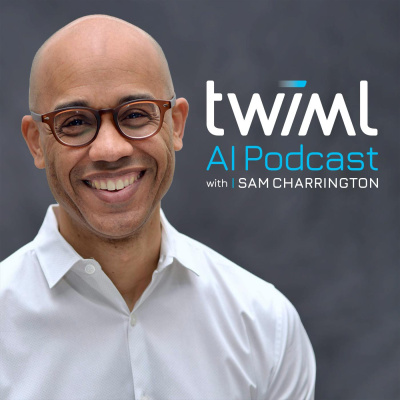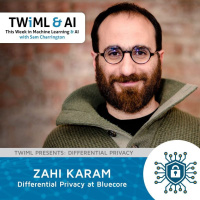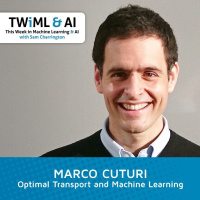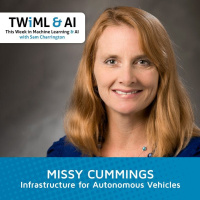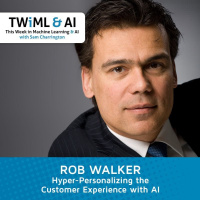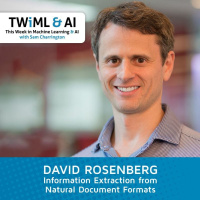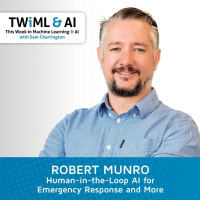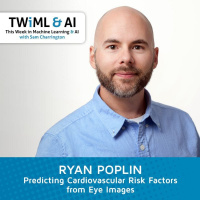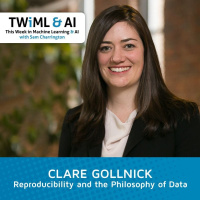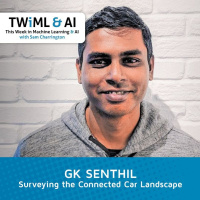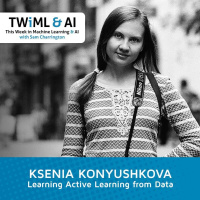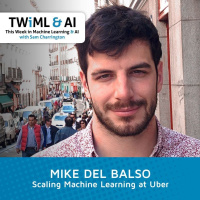Sinopsis
This Week in Machine Learning & AI is the most popular podcast of its kind. TWiML & AI caters to a highly-targeted audience of machine learning & AI enthusiasts. They are data scientists, developers, founders, CTOs, engineers, architects, IT & product leaders, as well as tech-savvy business leaders. These creators, builders, makers and influencers value TWiML as an authentic, trusted and insightful guide to all thats interesting and important in the world of machine learning and AI.Technologies covered include: machine learning, artificial intelligence, deep learning, natural language processing, neural networks, analytics, deep learning and more.
Episodios
-
Scalable Differential Privacy for Deep Learning with Nicolas Papernot - TWiML Talk #134
03/05/2018 Duración: 59minIn this episode of our Differential Privacy series, I'm joined by Nicolas Papernot, Google PhD Fellow in Security and graduate student in the department of computer science at Penn State University. Nicolas and I continue this week’s look into differential privacy with a discussion of his recent paper, Semi-supervised Knowledge Transfer for Deep Learning From Private Training Data. In our conversation, Nicolas describes the Private Aggregation of Teacher Ensembles model proposed in this paper, and how it ensures differential privacy in a scalable manner that can be applied to Deep Neural Networks. We also explore one of the interesting side effects of applying differential privacy to machine learning, namely that it inherently resists overfitting, leading to more generalized models. The notes for this show can be found at twimlai.com/talk/134.
-
Differential Privacy at Bluecore with Zahi Karam - TWiML Talk #133
01/05/2018 Duración: 38minIn this episode of our Differential Privacy series, I'm joined by Zahi Karam, Director of Data Science at Bluecore, whose retail marketing platform specializes in personalized email marketing. I sat down with Zahi at the Georgian Partners portfolio conference last year, where he gave me my initial exposure to the field of differential privacy, ultimately leading to this series. Zahi shared his insights into how differential privacy can be deployed in the real world and some of the technical and cultural challenges to doing so. We discuss the Bluecore use case in depth, including why and for whom they build differentially private machine learning models. The notes for this show can be found at twimlai.com/talk/133
-
Differential Privacy Theory & Practice with Aaron Roth - TWiML Talk #132
30/04/2018 Duración: 42minIn the first episode of our Differential Privacy series, I'm joined by Aaron Roth, associate professor of computer science and information science at the University of Pennsylvania. Aaron is first and foremost a theoretician, and our conversation starts with him helping us understand the context and theory behind differential privacy, a research area he was fortunate to begin pursuing at its inception. We explore the application of differential privacy to machine learning systems, including the costs and challenges of doing so. Aaron discusses as well quite a few examples of differential privacy in action, including work being done at Google, Apple and the US Census Bureau, along with some of the major research directions currently being explored in the field. The notes for this show can be found at twimlai.com/talk/132.
-
Optimal Transport and Machine Learning with Marco Cuturi - TWiML Talk #131
26/04/2018 Duración: 32minIn this episode, i’m joined by Marco Cuturi, professor of statistics at Université Paris-Saclay. Marco and I spent some time discussing his work on Optimal Transport Theory at NIPS last year. In our discussion, Marco explains Optimal Transport, which provides a way for us to compare probability measures. We look at ways Optimal Transport can be used across machine learning applications, including graphical, NLP, and image examples. We also touch on GANs, or generative adversarial networks, and some of the challenges they present to the research community. The notes for this show can be found at twimlai.com/talk/131.
-
Collecting and Annotating Data for AI with Kiran Vajapey - TWiML Talk #130
23/04/2018 Duración: 40minIn this episode, I’m joined by Kiran Vajapey, a human-computer interaction developer at Figure Eight. In this interview, Kiran shares some of what he’s has learned through his work developing applications for data collection and annotation at Figure Eight and earlier in his career. We explore techniques like data augmentation, domain adaptation, and active and transfer learning for enhancing and enriching training datasets. We also touch on the use of Imagenet and other public datasets for real-world AI applications. If you like what you hear in this interview, Kiran will be speaking at my AI Summit April 30th and May 1st in Las Vegas and I’ll be joining Kiran at the upcoming Figure Eight TrainAI conference, May 9th&10th in San Francisco. The notes for this show can be found at twimlai.com/talk/130
-
Autonomous Aerial Guidance, Navigation and Control Systems with Christopher Lum - TWiML Talk #129
19/04/2018 Duración: 52minOk, In this episode, I'm joined by Christopher Lum, Research Assistant Professor in the University of Washington’s Department of Aeronautics and Astronautics. Chris also co-heads the University’s Autonomous Flight Systems Lab, where he and his students are working on the guidance, navigation, and control of unmanned systems. In our conversation, we discuss some of the technical and regulatory challenges of building and deploying Unmanned Autonomous Systems. We also talk about some interesting work he’s doing on evolutionary path planning systems as well as an Precision Agriculture use case. Finally, Chris shares some great starting places for those looking to begin a journey into autonomous systems research. The notes for this show can be found at twimlai.com/talk/129.
-
Infrastructure for Autonomous Vehicles with Missy Cummings - TWiML Talk #128
16/04/2018 Duración: 43minIn this episode, I’m joined by Missy Cummings, head of Duke University’s Humans and Autonomy Lab and professor in the department of mechanical engineering. In addition to being an accomplished researcher, Missy also became one of the first female fighter pilots in the US Navy following the repeal of the Combat Exclusion Policy in 1993. We discuss Missy’s research into the infrastructural and operational challenges presented by autonomous vehicles, including cars, drones and unmanned aircraft. We also cover trust, explainability, and interactions between humans and AV systems. This was an awesome interview and i'm glad we’re able to bring it to you! The notes for this show can be found at twimlai.com/talk/128.
-
Hyper-Personalizing the Customer Experience w/ AI with Rob Walker - TWiML Talk #127
12/04/2018 Duración: 41minIn this episode, we're joined by Rob Walker, Vice President of decision management and analytics at Pegasystems, a leading provider of software for customer engagement and operational excellence. Rob and I discuss what’s required for enterprises to fully realize the vision of providing a hyper-personalized customer experience, and how machine learning and AI can be used to determine the next best action an organization should take to optimize sales, service, retention, and risk at every step in the customer relationship. Along the way we dig into a couple of key areas, specifically some of the techniques his organization uses to allow customers to manage the tradeoff between model performance and transparency, particularly in light of new laws like GDPR, and how all this ties to an enterprise’s ability to manage bias and ethical issues when deploying ML. We cover a lot of ground in this one and I think you’ll find Rob’s perspective really interesting. The notes for this show can be found at twimlai.com/talk/1
-
Information Extraction from Natural Document Formats with David Rosenberg - TWiML Talk #126
09/04/2018 Duración: 45minIn this episode, I’m joined by David Rosenberg, data scientist in the office of the CTO at financial publisher Bloomberg, to discuss his work on “Extracting Data from Tables and Charts in Natural Document Formats.” Bloomberg is dealing with tons of financial and company data in pdfs and other unstructured document formats on a daily basis. To make meaning from this information more efficiently, David and his team have implemented a deep learning pipeline for extracting data from the documents. In our conversation, we dig into the information extraction process, including how it was built, how they sourced their training data, why they used LaTeX as an intermediate representation and how and why they optimize on pixel-perfect accuracy. There’s a lot of interesting info in this show and I think you’re going to enjoy it. The notes for this show can be found at twimlai.com/talk/126.
-
Human-in-the-Loop AI for Emergency Response & More w/ Robert Munro - TWiML Talk #125
05/04/2018 Duración: 48minIn this episode, I chat with Rob Munro, CTO of the newly branded Figure Eight, formerly known as CrowdFlower. Figure Eight’s Human-in-the-Loop AI platform supports data science & machine learning teams working on autonomous vehicles, consumer product identification, natural language processing, search relevance, intelligent chatbots, and more. Rob and I had a really interesting discussion covering some of the work he’s previously done applying machine learning to disaster response and epidemiology, including a use case involving text translation in the wake of the catastrophic 2010 Haiti earthquake. We also dig into some of the technical challenges that he’s encountered in trying to scale the human-in-the-loop side of machine learning since joining Figure Eight, including identifying more efficient approaches to image annotation as well as the use of zero shot machine learning to minimize training data requirements. Finally, we briefly discuss Figure Eight’s upcoming TrainAI conference, which takes place on M
-
Systems and Software for Machine Learning at Scale with Jeff Dean - TWiML Talk #124
02/04/2018 Duración: 54minIn this episode I’m joined by Jeff Dean, Google Senior Fellow and head of the company’s deep learning research team Google Brain, who I had a chance to sit down with last week at the Googleplex in Mountain View. As you’ll hear, I was very excited for this interview, because so many of Jeff’s contributions since he started at Google in ‘99 have touched my life and work. In our conversation, Jeff and I dig into a bunch of the core machine learning innovations we’ve seen from Google. Of course we discuss TensorFlow, and its origins and evolution at Google. We also explore AI acceleration hardware, including TPU v1, v2 and future directions from Google and the broader market in this area. We talk through the machine learning toolchain, including some things that Googlers might take for granted, and where the recently announced Cloud AutoML fits in. We also discuss Google’s process for mapping problems across a variety of domains to deep learning, and much, much more. This was definitely one of my favorite convers
-
Semantic Segmentation of 3D Point Clouds with Lyne Tchapmi - TWiML Talk #123
29/03/2018 Duración: 36minIn this episode I’m joined by Lyne Tchapmi, PhD student in the Stanford Computational Vision and Geometry Lab, to discuss her paper, “SEGCloud: Semantic Segmentation of 3D Point Clouds.” SEGCloud is an end-to-end framework that performs 3D point-level segmentation combining the advantages of neural networks, trilinear interpolation and fully connected conditional random fields. In our conversation, Lyne and I cover the ins and outs of semantic segmentation, starting from the sensor data that we’re trying to segment, 2d vs 3d representations of that data, and how we go about automatically identifying classes. Along the way we dig into some of the details, including how she obtained a more fine grain labeling of points from sensor data and the transition from point clouds to voxels. The notes for this show can be found at twimlai.com/talk/123.
-
Predicting Cardiovascular Risk Factors from Eye Images with Ryan Poplin - TWiML Talk #122
26/03/2018 Duración: 42minIn this episode, I'm joined by Google Research Scientist Ryan Poplin, who recently co-authored the paper “Prediction of cardiovascular risk factors from retinal fundus photographs via deep learning.” In our conversation, Ryan details his work training a deep learning model to predict various patient risk factors for heart disease, including some surprising ones like age and gender. We also dive into some interesting findings he discovered with regards to multi-task learning, as well as his use of an attention mechanisms to provide explainability. This was a really interesting discussion that I think you’ll really enjoy! The notes for this show can be found at twimlai.com/talk/122.
-
Reproducibility and the Philosophy of Data with Clare Gollnick - TWiML Talk #121
22/03/2018 Duración: 38minIn this episode, i'm joined by Clare Gollnick, CTO of Terbium Labs, to discuss her thoughts on the “reproducibility crisis” currently haunting the scientific landscape. For a little background, a “Nature” survey in 2016 showed that "more than 70% of researchers have tried and failed to reproduce another scientist's experiments, and more than half have failed to reproduce their own experiments." Clare gives us her take on the situation, and how it applies to data science, along with some great nuggets about the philosophy of data and a few interesting use cases as well. We also cover her thoughts on Bayesian vs Frequentist techniques and while we’re at it, the Vim vs Emacs debate. No, actually I’m just kidding on that last one. But this was indeed a very fun conversation that I think you’ll enjoy! For the complete show notes, visit twimlai.com/talk/121.
-
Surveying the Connected Car Landscape with GK Senthil - TWiML Talk #120
19/03/2018 Duración: 30minIn this episode, I’m joined by GK Senthil, director & chief product owner for innovation at Toyota Connected. GK and I spoke about some of the potential opportunities and challenges for smart cars. We discussed Toyota’s recently announced partnership with Amazon to embed Alexa in vehicles, and more generally the approach they’re taking to get connected car technology up to par with smartphones and other intelligent devices we use on a daily basis. We cover in-car voice recognition and touch on the ways ML & AI need to be developed to be useful in vehicles, as well as the approaches to getting there. The notes for this show can be found at twimlai.com/talk/120
-
Adversarial Attacks Against Reinforcement Learning Agents with Ian Goodfellow & Sandy Huang
15/03/2018 Duración: 47minIn this episode, I’m joined by Ian Goodfellow, Staff Research Scientist at Google Brain and Sandy Huang, Phd Student in the EECS department at UC Berkeley, to discuss their work on the paper Adversarial Attacks on Neural Network Policies. If you’re a regular listener here you’ve probably heard of adversarial attacks, and have seen examples of deep learning based object detectors that can be fooled into thinking that, for example, a giraffe is actually a school bus, by injecting some imperceptible noise into the image. Well, Sandy and Ian’s paper sits at the intersection of adversarial attacks and reinforcement learning, another area we’ve discussed quite a bit on the podcast. In their paper, they describe how adversarial attacks can also be effective at targeting neural network policies in reinforcement learning. Sandy gives us an overview of the paper, including how changing a single pixel value can throw off performance of a model trained to play Atari games. We also cover a lot of interesting topics relati
-
Towards Abstract Robotic Understanding with Raja Chatila - TWiML Talk #118
12/03/2018 Duración: 47minIn this episode, we're joined by Raja Chatila, director of Intelligent Systems and Robotics at Pierre and Marie Curie University in Paris, and executive committee chair of the IEEE global initiative on ethics of intelligent and autonomous systems. Raja and I had a great chat about his research, which deals with robotic perception and discovery. We discuss the relationship between learning and discovery, particularly as it applies to robots and their environments, and the connection between robotic perception and action. We also dig into the concepts of affordances, abstract teachings, meta-reasoning and self-awareness as they apply to intelligent systems. Finally, we touch on the issue of values and ethics of these systems. The notes for this show can be found at twimlai.com/talk/118.
-
Discovering Exoplanets w/ Deep Learning with Chris Shallue - TWiML Talk #117
08/03/2018 Duración: 45minEarlier this week, I had a chance to speak with Chris Shallue, Senior Software Engineer on the Google Brain Team, about his project and paper on “Exploring Exoplanets with Deep Learning.” This is a great story. Chris, inspired by a book he was reading, reached out on a whim to a Harvard astrophysics researcher, kicking off a collaboration and side project eventually leading to the discovery of two new planets outside our solar system. In our conversation, we walk through the entire process Chris followed to find these two exoplanets, including how he researched the domain as an outsider, how he sourced and processed his dataset, and how he built and evolved his models. Finally, we discuss the results of his project and his plans for future work in this area. This podcast is being published in parallel with Google’s release of the source code and data that Chris developed and used, which we’ll link to below, so if what you hear inspires you to dig into this area, you’ve got a nice head start. This was a really
-
Learning Active Learning with Ksenia Konyushkova - TWiML Talk #116
05/03/2018 Duración: 31minIn this episode, I speak with Ksenia Konyushkova, Ph.D. student in the CVLab at Ecole Polytechnique Federale de Lausanne in Switzerland. Ksenia and I connected at NIPS in December to discuss her interesting research into ways we might apply machine learning to ease the challenge of creating labeled datasets for machine learning. The first paper we discuss is “Learning Active Learning from Data,” which suggests a data-driven approach to active learning that trains a secondary model to identify the unlabeled data points which, when labeled, would likely have the greatest impact on our primary model’s performance. We also discuss her paper “Learning Intelligent Dialogs for Bounding Box Annotation,” in which she trains an agent to guide the actions of a human annotator to more quickly produce bounding boxes. TWiML Online Meetup Update Join us Tuesday, March 13th for the March edition of the Online Meetup! Sean Devlin will be doing an in-depth review of reinforcement learning and presenting the Google DeepMind pap
-
Machine Learning Platforms at Uber with Mike Del Balso - TWiML Talk #115
01/03/2018 Duración: 49minIn this episode, I speak with Mike Del Balso, Product Manager for Machine Learning Platforms at Uber. Mike and I sat down last fall at the Georgian Partners Portfolio conference to discuss his presentation “Finding success with machine learning in your company.” In our discussion, Mike shares some great advice for organizations looking to get value out of machine learning. He also details some of the pitfalls companies run into, such as not have proper infrastructure in place for maintenance and monitoring, not managing their expectations, and not putting the right tools in place for data science and development teams. On this last point, we touch on the Michelangelo platform, which Uber uses internally to build, deploy and maintain ML systems at scale, and the open source distributed TensorFlow system they’ve created, Horovod. This was a very insightful interview, so get your notepad ready! Vote on our #MyAI Contest! Over the past few weeks, you’ve heard us talk quite a bit about our #MyAI Contest, which exp
